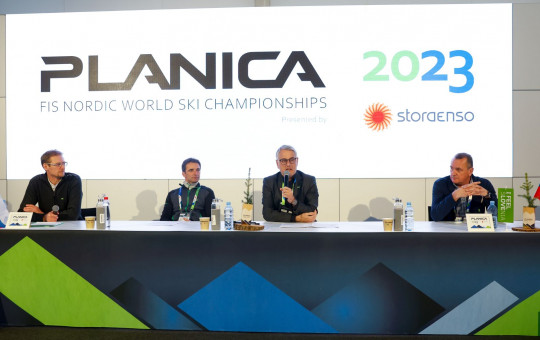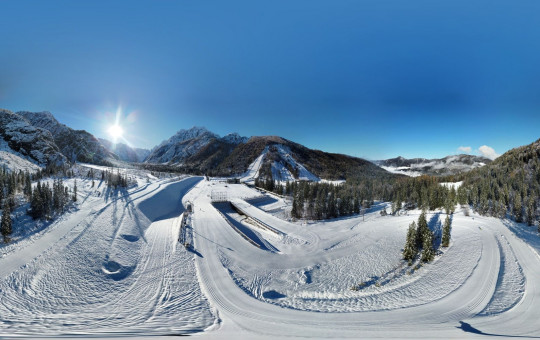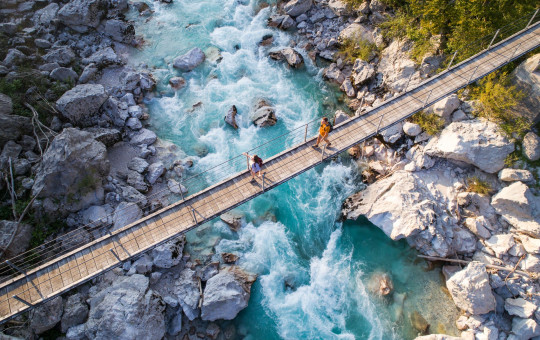Date: 27. February 2023
Time to read: 2 min
On the sidelines of the Nordic World Championships in Planica, the Government Communications Office organised on February 24th the second in a series of panel discussions on "Quality Life in the Alps for All". The speakers presented the Alpine Convention, which is a bridge between a sustainable Slovenia and the Alpine region. The Alpine Convention is an international treaty concluded by the Alpine countries - Austria, France, Liechtenstein, Monaco, Germany, Switzerland and the European Union, together with Slovenia - to promote sustainable development in the Alpine region. Slovenia holds the presidency of the Alpine Convention from the beginning of 2023 until the end of 2024 under the slogan "A quality life in the Alps for all".
Slovenia - active in the Alpine Convention since the beginning
"Slovenia has been active in the Alpine Convention since the beginning. The signing of the Convention is also the first international treaty signed by Slovenia since independence. We participated in the drafting of the Framework Convention and co-drafted the protocols that are now part of the Slovenian legal order. We are active in working bodies and take leading roles and chair working groups. The Alpine Convention is also one of the few international organisations where Slovenian is one of the official languages. The implementation of the Alpine Convention is most visible at the level of municipalities, which are working on issues such as sustainable mobility and transport, the role of tourism in local development, sustainable agriculture and forestry, and disaster risk reduction." Emil Ferjančič from the Ministry of Natural Resources and Spatial Planning.
-
The speakers presented the Alpine Convention, which is a bridge between a sustainable Slovenia and the Alpine region. Photo: Borut Podgoršek, Mors
-
Slovenia holds the presidency of the Alpine Convention from the beginning of 2023 until the end of 2024 under the slogan "A quality Alpine life for all". Photo: Borut Podgoršek, Mors
Balance of economic interests with environmental conditions
Dr Matej Ogrin, geographer, professor at the Faculty of Arts, expert in transport geography and President of the NGO CIPRA Slovenia - Society for the Protection of the Alps, emphasised the quality of life, highlighting the need to balance economic interests with environmental conditions, which can provide a good basis for a high standard of living for the Alpine population. This includes preserving habitats, quality of life and equal opportunities for the Alpine population. Slovenia wants to take a step forward and give a new impetus to this area, he stressed at the panel. In this context, he highlighted Alpine biodiversity and efforts in this area, which are important at the Alpine level as well as at a broader regional and global level, and Slovenia would like to underline the contribution of the Alpine Convention to the implementation of the post-2020 Global Biodiversity Framework. He added: "Slovenia emphasises the integration of climate change into formal education, with a focus on experiential learning in nature, and encourages possible future cooperation in this field. A lot of work is being done to raise awareness among young people, as Slovenia is special in that we have centres for extracurricular activities, and children are also educated in nature as part of their school curriculum."
-
The panellists were, from left to right: moderator Ana Tavčar, Emil Ferjančič from the Ministry of Natural Resources and Spatial Planning, Eva Štravs Podlogar, Director of the Upper Gorenjska Development Agency and Dr Matej Ogrin, geographer and professor at the Faculty of Arts. Photo: Borut Podgoršek, Mors
-
The panel also asked how to keep young people in the region, what opportunities there are for people in the Alps, how to create sustainable tourism that does not compromise values, and how to access local food. Photo: Borut Podgoršek, Mors
The panel also asked how to keep young people in the region, what opportunities there are for people in the Alps, how to create sustainable tourism that does not compromise values and how to access local food. Eva Štravs Podlogar, Director of the Development Agency of Upper Gorenjska, stressed that Slovenian tourism is committed to sustainable tourism, which is also being strengthened through the Green Scheme of Slovenian Tourism project. "We have recognised the importance of nature conservation, sustainable mobility and directing tourist flows. An important question is how to reconcile or balance tourism with the needs of the local environment".





